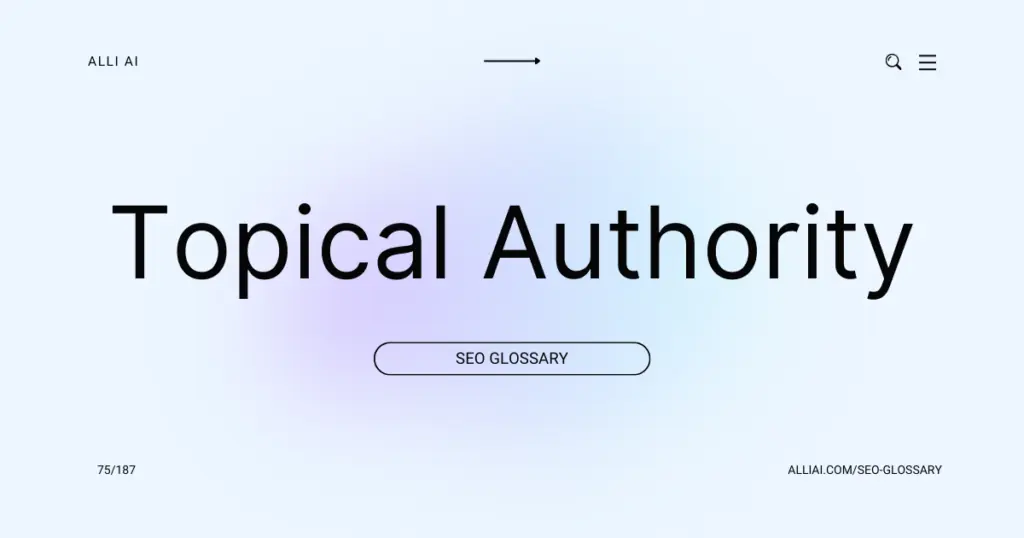What Does Topical Authority Mean?
Topical authority refers to the level of expertise and trustworthiness a website or content creator has on a specific subject or topic area. It is determined by the quality, depth, and reliability of the content provided, and signals to search engines that the source is a credible and authoritative voice on that topic, which can improve search rankings.
Where Does Topical Authority Fit Into The Broader SEO Landscape?
Topical Authority is integral to SEO as it helps determine a website’s expertise and credibility on a specific subject, influencing its rankings in search engine results pages (SERPs). By consistently producing in-depth content around a specific topic, a site can be recognized by search engines as a go-to resource, leading to improved organic search visibility.
This concept is rooted in content clustering and the use of pillar pages linked to related content pieces, or cluster pages, based on subtopics. This structured approach not only benefits user navigation but also allows search engines to easily parse through related content, understanding the overall topical coverage which enhances the site’s perceived expertise.
In terms of link building, earning backlinks from reputable sites within the same domain further solidifies a site’s authority on specific subjects, which can positively impact search rankings.
Additionally, Google’s algorithms, such as E-A-T (Expertise, Authoritativeness, Trustworthiness), factor in a site’s topical authority when determining SERP rankings. High-quality, well-researched content that aligns with user intent and provides real value is more likely to be recognized under these guidelines.
In summary, Topical Authority is crucial for improving a site’s visibility and ranking by establishing it as a credible source on specific topics, which in turn can lead to more traffic and higher engagement from targeted audiences.
Real Life Analogies or Metaphors to Explain Topical Authority
1. Imagine Topical Authority as a master gardener in a community. Just as the community trusts the gardener to know everything about plants, soil, and seasons, a website gains trust by demonstrating extensive knowledge and reliability on a specific subject area.
2. Topical Authority is like being the go-to chef for Italian cuisine in a city full of restaurants. Just as diners would seek out this chef for the best Italian dishes, users and search engines favor websites that offer the most comprehensive and expert information on a specific topic.
3. Think of Topical Authority as a library dedicated entirely to one genre of books, like science fiction. Visitors to this library would find the most exhaustive resources, knowledgeable staff, and passionate discussions about science fiction, making it the leading place to go for anyone interested in that genre.
4. Topical Authority can be likened to a seasoned tour guide specializing in ancient Greek history. Just as tourists trust this guide to provide the most insightful, accurate, and detailed information about ancient Greek sites, Google trusts websites that consistently deliver in-depth content within a particular niche.
5. Consider Topical Authority as a university professor who has spent years focusing solely on renewable energy. Their depth of understanding, scope of research, and ability to answer complex questions establishes them as a leader in the field, just as thorough, focused content establishes a website’s dominance in its niche.
How the Topical Authority Functions or is Implemented?
1. Keyword Research:
– Identify core topics relevant to your business or niche.
– Expand these into a list of subtopics using tools like Google Keyword Planner, Ahrefs, or SEMrush.
2. Content Creation:
– Develop comprehensive content that covers core topics and subtopics in depth.
– Ensure the content is high quality, well-researched, and provides real value to the reader.
3. Internal Linking:
– Use a structured internal linking strategy to link all content related to a specific topic.
– This helps search engines understand the hierarchical relationship between the main topic and its subtopics.
4. Content Updates and Expansion:
– Regularly update existing content to keep it current and relevant.
– Continuously expand on topics with new information and content types, such as videos, podcasts, or infographics.
5. User Engagement:
– Enhance user engagement through interactive elements, comment sections, and social media integration.
– Monitor metrics such as bounce rate, time on site, and pages per session to gauge user engagement.
6. Backlink Building:
– Acquire backlinks from reputable sites within the same topical niche.
– Focus on earning links that naturally validate the site’s authority on the subject matter.
7. Social Proof and Authority Indicators:
– Include expert opinions, citations, and contributions to increase credibility.
– Display certifications, awards, or endorsements related to the topic.
8. Technical SEO:
– Ensure the website is technically optimized with a focus on site architecture, mobile responsiveness, and page speed.
– Use schema markup to help search engines understand the content and context better.
9. Topic Clustering:
– Organize content into clusters where a single “pillar” page acts as the main hub of content for an overarching topic and multiple content pages that relate to the same topic link back to the pillar page and to each other.
10. Performance Monitoring and Analysis:
– Regularly track the performance of topical keywords and content clusters.
– Use tools like Google Analytics and Google Search Console to analyze traffic, rankings, and other SEO indicators.
– Adjust strategies based on analytical insights to improve overall topical authority.
Impact Topical Authority has on SEO
Topical Authority enhances a website’s SEO performance by signaling to search engines that the site is a reliable source of information on specific subjects, leading to higher rankings in search results. This is achieved by creating comprehensive, high-quality content that covers a topic extensively across multiple related articles or pages. Search engines favor websites that exhibit in-depth knowledge and expertise in a particular area, interpreting this as a cue for higher relevance and value to user queries specific to that topic.
Furthermore, establishing Topical Authority improves user experience by providing visitors with thorough, authoritative content that effectively addresses their needs and questions. This increases user engagement, reduces bounce rates, and encourages longer site visits and more interactions. As user engagement metrics improve, search engines further recognize the site’s value, potentially enhancing its rankings and visibility.
Overall, this focus on a specific domain or topic not only builds trust with users but also with search engines, which is crucial for sustained SEO success.
SEO Best Practices For Topical Authority
1. Identify your niche or topic area that you want to establish authority in.
2. Research key subtopics and queries related to your main topic using tools like Google Keyword Planner, Ahrefs, or SEMrush.
3. Create a content roadmap, planning to write comprehensive, in-depth articles on each subtopic.
4. Write high-quality, authoritative content for each identified subtopic. Ensure each piece is well-researched, citing credible sources, and provides real value to the reader.
5. Include internal links between related content on your website to keep users engaged and to spread link equity around your topical cluster.
6. Optimize each piece of content for SEO, focusing on on-page elements such as title tags, meta descriptions, header tags, and the use of relevant keywords naturally within the text.
7. Use schema markup where appropriate to help search engines understand the context of your content.
8. Build external links to your content by promoting your articles through guest blogging, social media shares, and outreach to influencers within your niche.
9. Regularly update older content to keep it relevant as new information becomes available.
10. Monitor your site’s performance through analytics and search engine ranking positions (SERPs) to track progress and identify areas for improvement.
Common Mistakes To Avoid
1. Focusing Too Narrowly on a Single Topic:
– Avoid by diversifying content within the broader theme; cover related subtopics, questions, and current trends.
2. Producing Low-Quality Content:
– Prioritize well-researched, factual, and detailed content that provides real value to the reader.
3. Inconsistent Publishing:
– Develop a content calendar and stick to a regular publishing schedule to frequently update and expand on topic-related content.
4. Ignoring User Experience and Technical SEO:
– Ensure that the site is user-friendly, mobile-optimized, and loads quickly; organize content logically.
5. Neglecting Internal Linking:
– Use internal links wisely to guide users and search engines through relevant topics and subtopics on your website.
6. Overlooking the Importance of Backlinks:
– Aim to get backlinks from reputable and relevant sites to boost the domain’s authority and credibility.
7. Not Using Multimedia and Diverse Content Formats:
– Incorporate videos, podcasts, infographics, and webinars to enrich the textual content and engage different types of learners.
8. Failure to Update Old Content:
– Regularly review and update outdated content to ensure all information remains current and relevant, reflecting the latest industry developments.
9. Ignoring Audience Feedback and Engagement:
– Monitor user comments, social media interactions, and feedback to align content development with audience needs and questions.
10. Lacking a Clear Unique Selling Proposition (USP):
– Define what sets your content apart from competitors and consistently highlight this uniqueness in your material.
By addressing and actively managing these potential pitfalls, you can effectively establish and maintain topical authority in your chosen subject area.






